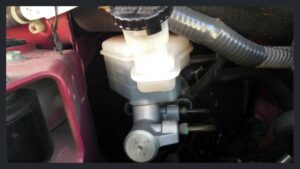
5 Symptoms of a Bad Clutch Master Cylinder
The clutch master cylinder is a vital component in manual transmission vehicles. When you press the clutch pedal, it disengages the drive wheels from the engine, allowing you to change gears.
Without the clutch master cylinder to generate hydraulic pressure, the clutch could not perform this function. Therefore, if something happens to the clutch master cylinder, it will have a major impact on your ability to change gears and drive your car.
What is a clutch master cylinder? In a hydraulic clutch system, the clutch master cylinder pushes clutch fluid down into the slave cylinder. The slave cylinder then pushes the clutch fork, which acts as a lever to separate the pressure plate from the flywheel. This process separates the engine from the drivetrain. Most modern vehicles use hydraulic clutches.
Most important symptoms of a defective clutch master cylinder
To determine when your car’s clutch master cylinder is failing, you can recognize certain signs that can help you diagnose the problem. Below are the most important symptoms of a faulty clutch master cylinder:
1) Strange noises
Do you hear any strange noises when you change gears or press the clutch pedal? If so, this could be an early warning sign that your clutch master cylinder is bad.
As the condition of the cylinder worsens, the noise often gets louder or occurs more frequently. If you’ve already noticed it, don’t yell too much. The best thing to do is to identify the source of the problem and replace the defective component.
Abnormal noises when you press the clutch pedal can also be caused by defects in other transmission parts, such as the pressure plate or release bearing.
2) Switching problems
If the clutch master cylinder is damaged or worn, it may not be able to generate the hydraulic pressure needed to properly shift the transmission. This may be due to a leak in the cylinder. As a result, the clutch will not fully disengage when you press the clutch pedal. Is your transmission jerking or becoming very hard to put into gear? This could be an indication that you have a problem with your clutch master cylinder. These problems can also occur if your slave cylinder is defective.
Bleed the clutch lines
If you are having trouble shifting gears, try bleeding the clutch system first. In some cases, you may need to bleed either the master or slave cylinder on a bench, especially if you have purchased a new unit and it is dry inside. A benchtop bleed may be necessary if the master or slave cylinder is positioned so that the bleed screw is not at the highest point on the unit when the car is on level ground. This is because air will collect at the top of the parts and cannot escape.
3) Low Clutch Resistance
There should always be a small resistance when you press the clutch pedal. If the clutch pedal feels too soft or spongy when you press it, your clutch master cylinder may be leaking.
In many of these cases, the seal in the master cylinder is the source of the leak. You can try to repair these seals, but in some cases, it may be easier and more cost-effective to replace the entire clutch master cylinder.
4) Clutch Drops to the Floor
Does the clutch pedal drop to the floor when you press it? If the clutch drops all the way down or sinks past the rest point, it indicates that the clutch is not receiving enough hydraulic pressure. This symptom can occur if the clutch master cylinder has completely failed.
5) Dirty Clutch Fluid
To determine the condition of your clutch fluid, check your clutch fluid reservoir. If the fluid is dark, dirty, or there is not enough fluid in the reservoir, your clutch master cylinder may have a problem.
If the internal seal in the clutch master cylinder becomes damaged or worn, it can cause the clutch master cylinder to become dirty and the fluid to become contaminated. This usually happens as the seal gets older.
If the clutch master cylinder starts to leak, the fluid level will also be low. Change your clutch fluid as soon as you notice it is dirty. If the new fluid gets dirty quickly, you should also consider replacing the clutch master cylinder.

